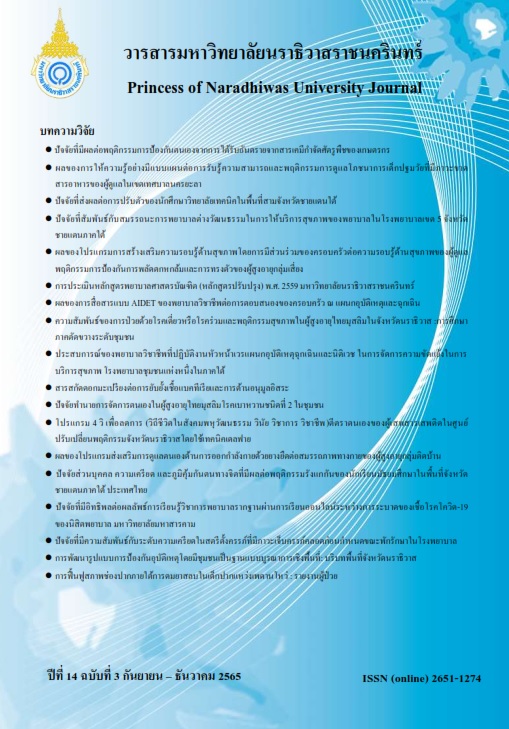The Evaluation of Bachelor of Nursing Science Program (Revised Curriculum) 2016 Princess of Naradhiwas University
Keywords:
Program evaluation, stainless steel, Bachelor of nursing science programAbstract
The objective of this descriptive research study was to assess the Bachelor of Nursing Science program. (Revised Curriculum) 2016, Faculty of Nursing, Princess of Naradhiwas University. The sample consisted of 232 first to third-year nursing students and 20 stakeholders involved in the program such as nurses, mentors, doctors, alumni, and the internal and external lecturers of the Faculty of Nursing. The CIPP model was the conceptual framework in this study. The research instruments were questionnaires covering the program's context, inputs, process and outcome. Content validity were .99, .98, 1.00, 1.00, respectively, and Cronbach's Alpha coefficient were .95, .97, .98, .99, respectively. Data were analyzed using descriptive statistics and focus group interviews for qualitative data, which were analyzed by content analysis. The results are as follows:
1. The program’s context; the average and SD scores of program’s objectives were at the good level ( X= 4.31, SD = 0.63), and the scores of the program structure’s opinions were at the reasonable level ( X = 4.45, SD = 0.66)
2. The program’s input; the average of opinion scores regarding lecturers’ qualifications were at the good level (X = 4.15, SD = 0.78) and the students’ qualifications scores were at the reasonable level ( X= 4.34, SD = 0.66)
3. The program’s process; the average of opinion scores about teaching and learning approach were at the reasonable level (X = 4.29, SD = 0.60)
4. The program’s outcome; the average opinion scores of the feeling to graduate successfully from this program were at the best level ( X= 4.83, SD = 0.38)
References
Chularut, P. (2018). Learning management for students in the Thailand 4.0 era. Veridian E-Journal, Silpakorn University, 11(2), 2363-2380.
Klommeck, J., Lortajakul, C., Eiamla-or, P., & Wongsasung, J. (2021). The evaluation of bachelor nursing science curriculum (revised in 2017), Mission Faculty of Nursing, Asia-Pacific International University. APHEIT Journal of Nursing and Health, 3(1), 16-31.
Kooariyakul, A., Chidnayee, S., Wuttijurepan, A., Udomleard, M., Lortamma, P., & Sripalakich, J. (2017). The evaluation of the Bachelor of Nursing Curriculum revised edition 2012. Boromarajonani College of Nursing Uttradit Journal, 9(1), 44-58.
Ministry of Education. (2010). The National Education Act, B.E. 2553. Bangkok: Soupaisallaw printing. (in Thai).
Patphol, M. (2019). Concept of curriculum development. Bangkok: Innovative Leaders Center of Curriculum and Learning. (in Thai).
Poonchai, S., Arayathanitkul, B., Meeparn, A., Indhratana, A., Untaja, P., Prasittivejchakul, A., & Chewsothon, S. (2019). An evaluation of the bachelor science in nursing curriculum (revised. B.E.2555) of the Royal Thai Army nursing college. Journal of The Royal Thai Army Nurses, 20(2), 380-389.
Ritudom, B. (2017). An Evaluation of the Bachelor of Nursing Science Curriculum (Revised curriculum, 2012), RoyalThai AirForce Nursing College. Journal of the Royal Thai Army Nurses, 18(2), 203-211.
Ruengrong, P., Jiravarapong, B., Manyum, W., Somyaron, W., Muendet, S., & Srisurat, C. (2014). Educational technology VS Thai teachers in 21st Century. Panyapiwat Journal, 5(1), 195-205.
Stufflebeam, D.L., & Zhang, G. (2017). The CIPP evaluation model: How to evaluate for improvement and accountability. Guilford Publications.
Thailand Nursing and Midwifery Council (2010). Competencies of Registered Nurse. Bangkok: Siriyod Printing Press. (in Thai).
Additional Files
Published
How to Cite
Issue
Section
License
Copyright (c) 2022 Princess of Naradhiwas University Journal

This work is licensed under a Creative Commons Attribution-NonCommercial-NoDerivatives 4.0 International License.




